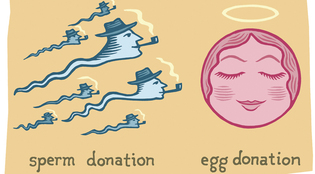 loading
loading
FindingsSperm donors and egg donorsGender differences in the egg- and sperm-donation industry.  Gregory NemecView full image
Are men and women donors treated differently in the big-money marketplace for fertile sperm and eggs? New research by Yale’s Rene Almeling suggests the answer is yes. In interviews with donors and donation staff around the country for her new book, Sex Cells: The Medical Market for Eggs and Sperm, she found that while sperm banks treat men like paid employees, a woman’s egg donation “is considered a gift.” Says Almeling, an assistant sociology professor, “They are told how important they are and the impact they’re having.” In turn, those differing approaches affect how the donors think about themselves. Egg donors, for whom the donation process is more medically risky, feel proud about what they’ve done, even if money was the reason they donated, Almeling found: “They’d say, 'That money is a gift for the gift that I’ve given.’” However, the sperm donors she interviewed, who were paid an average of $75 to $100 per deposit, didn’t use that word. “The men said, 'I feel like I’m an asset for the sperm bank’ or 'a resource for the sperm bank,’” Almeling says. Almeling noted another difference. While the men viewed themselves as the fathers of the babies born of their donations, “the women were absolutely adamant that they were not mothers,” she says. There may be several reasons why, Almeling says, including that egg agencies talk constantly about the infertile women who will receive the eggs. (At sperm banks, the topic of the women who will receive the sperm is taboo.) Or, Almeling says, it could have to do with long-held social beliefs: “We have this cultural equation that providing sperm makes someone a father.”
The comment period has expired.
|
|